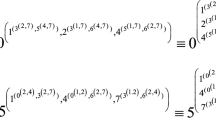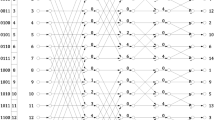Abstract
This paper describes a design synthesis environment which can generate an efficient VLSI layout from a recursive DSP algorithm specified by a graph. The design synthesis environment is divided into three parts: optimal schedule generation, circuit synthesis, and VLSI layout generation (silicon compilation). The scheduler first computes optimality conditions for a given input algorithm and then finds a schedule which satisfies the optimality conditions. We have employed a cyclo-static optimal multiprocessor compiler as a scheduler. The circuit synthesis component translates the optimal schedule into a structural specification, including the control structures, for an circuit realization. In the final part, a VLSI layout is generated from the structural specification. We have chosen the LAGER system for the silicon compilation. This paper illustrates the design synthesis process with complete details of a simple, complete example, a second order Direct Form II IIR filter.
Similar content being viewed by others
References
S.Y. Kung,VLSI Array Processors, Prentice-Hall, 1988.
T.P. Barnwell III and C.J.M. Hodges, “Optimal Implementation of Signal Flow Graphs on Synchronous Multiprocessors,”International Conference on Parallel Processing, Belaire, Michigan, August 1982, pp. 90–95.
T.P. Barnwell III, C.J.M. Hodges, and M. Randolf, “Optimal Implementation of Single Time Index Signal Flow Graphs on Synchronous Multiprocessor Machines,”International Conference on Acoustics, Speech, and Signal Processing, Paris, France, May 1982, pp. 679–682.
H.R. Forren, “Multiprocessor Design Methodology for Real-Time DSP Systems Represented by Shift-Invariant Flow Graphs,” Ph.D. thesis, Georgia Institute of Technology, May 1988.
S.H. Lee, “A Unified Approach to Optimal Multiprocessor Implementation from Non-Parallel Algorithm Specifications,” Ph.D. thesis, Georgia Institute of Technology, Dec. 1986.
S.H. Lee and T.P. Barnwell III, “Multiprocessor Implementations from Non-Parallel Algorithm Specifications,”International Conference on Acoustics, Speech, and Signal Processing, New York, NY, April 1988.
D.A. Schwartz, “Synchronous Multiprocessor Realizations of Shift-Invariant Flow Graphs,” Ph.D. thesis, Georgia Institute of Technology, June 1985.
C. Shung, R. Jain, K. Rimsay, E. Wang, M. Srivastava, E. Lettang, S. Azim, B. Richards, P. Hilfinger, J. Rabaey, and R. Brodersen, “An Integrated CAD System for Algorithm-Specific IC Design,”IEEE Trans. on CAD, May 1991.
D. Gajski and D. Thomas, “Introduction to Silicon Compilation,” inSilicon Compilation, Addison Wesley, 1988, pp. 1–48.
D.A. Schwartz and T.P. Barnwell III, “Cyclo-Static Multiprocessor Scheduling for the Optimal Realization of Shift-Invariant Flow Graphs,”International Conference on Acoustics, Speech, and Signal Processing, Tampa, FL, March 1985, pp. 1384–1387.
A. Fettweis, “Realizability of Digital Filter Networks,”Arch. Elek. Ubertragung, Vol. 30, pp. 90–96, February 1976.
M. Renfors and Y. Neuvo, “The Maximum Sampling Rate of Digital Filters Under Hardware Speed Constraints,”IEEE Trans. on Circuits and Systems, pp. 196–202, 1981.
P. Gelabert and T.P. Barnwell III, “Optimal Automatic Periodic Scheduler for Fully Specified Flow Graphs,”IEEE Trans. on ASSP, Feb. 1993.
P. Gelabert and T.P. Barnwell III, “Optimal Automatic Periodic Multiprocessor Compiler for Multi-bus Networks,”International Conference on Acoustics, Speech, and Signal Processing, San Francisco, March, 1992, pp. V593–V596.
D.A. Schwartz and T.P. Barnwell III, “Cyclo-Static Solutions: Optimal Multiprocessor Realization of Recursive Algorithms,” in S.Y. Kung, et al. (Eds.),VLSI Signal Processing II, IEEE Press, pp. 117–128, 1986.
C.P. Hong, “Implementation of Recursive Shift-Invariant Flow Graphs in Parallel/Pipelined Processing Environments,” Ph.D. thesis, Georgia Institute of Technology, Dec. 1991.
R. Rudell and R. Segal, “BDSYN User's Manual,” Tech. Rep. Berkeley CAD Tool Documentation, Unversity of California at Berkeley, Jan. 1988.
S.Y. Kung, H. Whitehouse, and T. Kailath,VLSI & Modern Signal Processing, Prenctice-Hall, 1985.
P. Paulin and J. Knight, “Force-Directed Scheduling in Automatic Data Path Synthesis,”Proc. 24th Des. Automation Conf., 1987.
D. Thomas et al., “The System Architect Workbench,”Proc. 25th Des. Automation Conf., 1988.
B.M. Pangrle, “Splicer: A Heuristic Approach to Connectivity Binding,”Proc. 25th Des. Automation Conf., 1988.
B.S. Haroun and M. I. Elmasry, “SPAID: An Architectural Synthesis Tool for DSP Custom Applications,”IEEE Journal of Solid-state Circuits, pp. 426–435, 1989.
M. Horowitz,IRSIM User's Manual Stanford University, 1988.
H. Kim, “A Design Synthesis Environment for Recursive DSP Algorithms Represented by Shift-Invariant Flow Graphs,” Ph.D. thesis, Georgia Institute of Technology, March 1993.
Author information
Authors and Affiliations
Additional information
This work was supported in part under the Joint Services Electronics Program Contract # DAAL-03-90-C-0004.
Rights and permissions
About this article
Cite this article
Kim, H.K., Barnwell, T.P. A design synthesis system for recursive DSP algorithms represented by fully specified flow graphs. Journal of VLSI Signal Processing 11, 35–50 (1995). https://doi.org/10.1007/BF02106822
Received:
Revised:
Published:
Issue Date:
DOI: https://doi.org/10.1007/BF02106822




